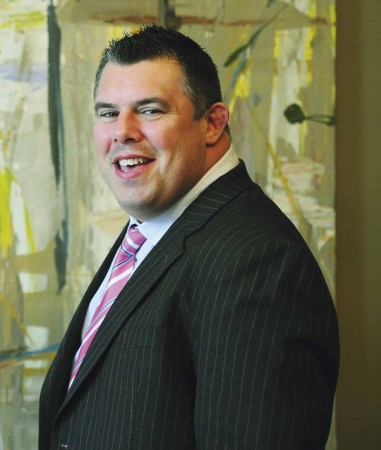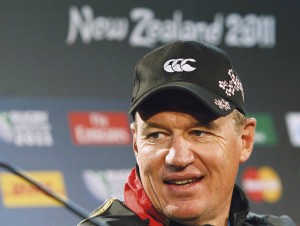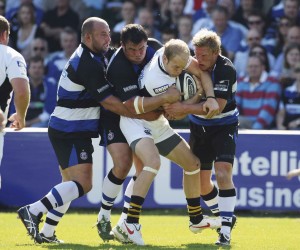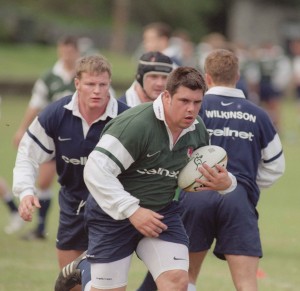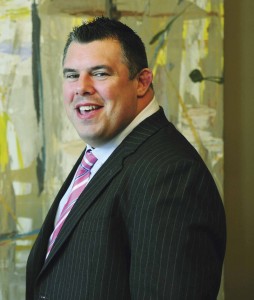
On the couch: the ex-Bath props settle down to discuss the strains and stresses of professional rugby
IN OUR February issue Duncan Bell opened up to Rugby World with his long time friend, ex-teammate and member of the front row union, David Flatman, about the pressures of professional rugby and why the onus is on friends and family as much as those suffering mental health problems to start talking. If you missed it, you can download the feature here, as it appeared in our magazine. Or read below.
Duncan Bell and David Flatman are two of rugby’s larger-than-life characters. With over 400 first-class games between them and a bundle of England caps, they are the personification of the game’s ‘good eggs’.
A perfect example of this came en route to the majestic setting of Farleigh House, the stately home-cum-training centre for their beloved Bath. Boarding the train, I saw an email from Bell: Sorry, can’t make it. With my mind scrambling for a Plan B, a minute later, Bell followed up with: Only joking mate, see you in a few hours. That set the tone for an interview where laughs were as plentiful as soul-searching. On hearing the tale, Flatman smirked and said his only regret was it hadn’t been him with the wind-up.
In rugby culture this behaviour is standard, with the onus on looking for a gag or some banter. Indeed, rugby’s reputation is of alpha males who’ve eaten their three Shredded Wheat before taking to the field to physically impose themselves on similarly oversized men. Yet, Bell, the 19st, 6ft 1in ex-England prop, doesn’t conform to the stereotype.
Last April, the 38-year-old announced his retirement. In doing so, he disclosed that he’d been suffering from depression, on and off, for a decade. In a searingly honest interview, he admitted reaching a nadir, but wanted to speak out to help other sportsmen in his chosen sport who were suffering in silence.
For Bell, doing the ‘coming out’ interview hadn’t been in the original plan. “I was going to do a bog-standard retirement piece but I’d just confided to Flats about my depression and anxiety, and his response was that I could help so many people. My reaction was, ‘No way, not in a million years’. However, Flats is a wise man, with a way with words, so he changed my mind.
“Coincidentally, at the same time, an old-mate, Richard Bryan, an RPA (Rugby Players’ Association) rep, mentioned the LPP programme, a consultation service for players with problems, like gambling or substance abuse. It’s a confidential service, so I opened up to him and said I’d like to get involved. We agreed to put some video footage together to show to players every season as part of their programme.”
For Bell, such an admission was more nerve-racking than running out in front of 80,000 people at Twickenham. “I’m not one for being the centre of attention, I don’t like standing out in the crowd, but I was concerned about my team-mates. I knew I had to tell them before they read it in the paper. The only way was to tell them all together.”
Bell still finds the resulting video of him unburdening his problems to his team-mates uncomfortable viewing, but Flats is glad he went ahead. “The lads didn’t know a thing. What was funny is that Belly didn’t mention it was depression and at the time he was going through a divorce, so a few of them thought he was coming out as gay, like Gareth Thomas, so in the middle of his speech, he blurted out, ‘I’m not gay’, and it broke the ice. It was very brave of him to do it.”
In the aftermath of the interview, Bell was inundated with supportive messages.
“The response was overwhelming. Lots of rugby people confided in me that they had been struggling and I’d have never known. I still get a couple of messages a week, which shows that a small sacrifice from me still resonates with people.” One of the challenges all players face is forging a life once the umbilical cord of rugby has been cut, and Bell is no different. “It was my job for 19 years but life is different now, I’m not a rugby player anymore. It’s very strange to not be part of it.”
Flatman feels relieved that Bell opened up while still in playing colours, but wishes he’d done it sooner. “If Belly had spoken out six months earlier, he’d have had longer to deal with it in the best environment on earth: the changing room. Rugby players are ruthless. They’ll rip you to pieces but they love you for it. The end of a rugby career is an unsettling time for an ex-pro. For many, it’s that fear of going into the unknown.”
Flatman says another reason why the change is so challenging is that after you’re cocooned in a close-knit team environment, you come to rely on your team-mates. “I realised only recently that I turned to my team-mates when anything was happening in my life,” he says. “Nowadays my wife is the friend she always thinks she should have been to me.”
Many high-profile sportsmen, such as Stan Collymore, Marcus Trescothick and Ricky Hatton, have revealed their mental health battles and Bell says they deserve credit as trailblazers. “If I’d been the first person in sport to speak out, I may have had second thoughts. Yet in the game I hoped people would understand who I was, what I’ve done and where I was coming from.”
While Bell was the first high-profile rugby player in Britain to openly admit to a struggle with depression, he wasn’t the first worldwide. All Black great John Kirwan had done it years before. “JK is an inspiration,” says Bell. “A few weeks before I did the article, I was involved in the Help for Heroes game at Twickenham where he was coach to the Northern Hemisphere XV. I was struggling and wanted to make a beeline for him but bottled it. Luckily I was involved with him in a Baa-Baas game after the interview and he said, ‘Brother, why didn’t you say anything?’ before we had a long chat.”
Eight months on, Bell is coaching at Lydney RFC and in a far more positive frame of mind. “I’d been suffering on and off for a decade or more and was going through a tough time. On the advice of my doctor, I took antidepressants and it was the best thing I could have done. Speaking out was a turning point and lifted a huge weight off my shoulders.”
Bell says credit must go to the RPA for their continued support. “Damian Hopley (RPA chief executive) has been proactive in player support along with my former front-row buddy David Barnes. The LPP programme has been round for a while and I’d like to think in my little way that I’ve helped. It’s just sad that it took the death of former Sale player Selorm Kuadey (who took his own life) to highlight mental illness, but sometimes out of a tragedy comes a positive.”
The last eight months haven’t been entirely without their drawbacks, however. “I’ve not spoken to my brother since
and my relationship with my mother is very strained.” Bell, who has four children aged 11, eight, six and four, looks to the future with genuine hope. “I’m busy at work doing mortgage advice and I’m upbeat. I’m not saying there aren’t bad days but things have improved. I’m off antidepressants and have been ‘clean’ for a year. I’m busy enough to not be too introspective. Before when I wasn’t busy, I may have faltered but now I understand who I am as a person. I’m older and wiser.”
Flatman, for his part, is happy to see his friend on an upward curve. “Belly has been hugely courageous but once you’ve said you have a problem it doesn’t mean that’s the end of it. Part of your journey is being strong enough to repeatedly say ‘I’m not okay’ and having someone to talk to. There are a number of people who would be there for Duncan in a second if he sent a text or made a call, but when you put the light off you’re on your own and that can be brutal.”
Flatman, for one, hadn’t picked up that Bell was struggling. “I’m not going to claim I did, though I had a feeling rugby was coming to an end for him and wondered how he’d cope. He never liked getting shouted at or told what to do. We used to joke that he needed his tyres pumped up, but some of the best players in the world are like that.”
Flatman, whose father and sister are psychologists, says it’s vitally important that all of us are on hand to offer support. “It’s not up to you to define if you have mental health issues but if you’re struggling, think who to speak to and have that conversation. Rugby players spend a lot of time beating away unconscious thoughts of anxiety. It’s a very pressured environment where you get critiqued in front of your peers on a day-to-day basis. On the outside you say you’re fine, but on the inside you’re hurting.”
Bell agrees and hopes that society increasingly looks out for friends and family. “For many, the hardest thing is finding the right person to talk to. It’s still taboo in some places and perceived as a weakness. Some think there can’t be anything worse than telling their family there’s something wrong ‘upstairs’. The first session I had with a professional, I took the mickey out of myself for half- an-hour. Before she asked, ‘Why are you here?’ I found it easier than sitting down with close family.”
The final words go to Flatman. “There are different types of help: confiding in someone you trust or seeing a professional who knows how to help.
“When I was injured, having my wife to make me a cup of tea was invaluable but it wasn’t going to mend my shoulder. I suppose it’s qualified support and unqualified support and hopefully Duncan knows he now has both.”
Don’t forget, you can download the feature here, as it appeared in our magazine.
Time to Change is England’s biggest mental health anti-stigma programme, run by Mind and Rethink Mental Illness. Start your conversation at time-to-change.org.uk or hashtag #timetotalk





